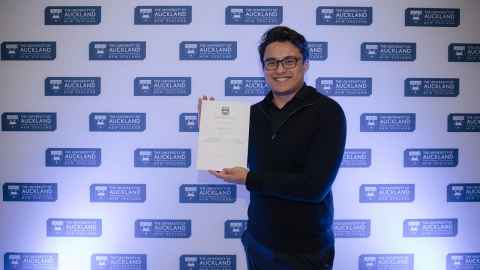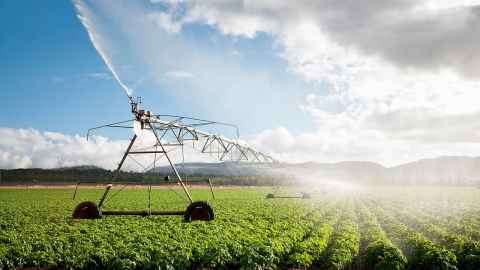Students collaborate on QS sustainability initiative and boost career skills
26 January 2024
Another group of University of Auckland students has completed the Future17 programme, experiencing real-life insights into solving global sustainability challenges.

Fourth-year University of Auckland student Adam Wong-Toi says being able to collaborate with students and businesses around the world was a highlight of his recent involvement with the Future17 SDG programme.
Adam, studying for a BA/BSc, is one of the students from Waipapa Taumata Rau to have recently completed the Quacquarelli Symonds (QS) initiative, which sees international teams of students from universities around the world unite for real-life projects focused on achieving the 17 Sustainable Development Goals (SDGs). The aim is to develop SDG literacy and build skills needed for impactful careers.
The graduating students held an online celebratory graduation event on 26 January 2024, which for the New Zealand students was 1am on the 27 January.
It was really rewarding to be able to work with other students overseas who all shared a passion for sustainability and the SDGs.
Future17 was created by higher education analyst QS and the University of Exeter in 2022. The University of Auckland has been part of the programme since 2023 and has had two intakes. The next group starts their work on 29 January.
Adam worked with students from Stellenbosch University (South Africa) and LUISS University (Rome), along with academics in the United Arab Emirates and Egypt, and project partner, the Eco Friendly Web Alliance (EFWA) in the UK.
“It wasn’t the typical university group project. Although the time zones sometimes provided a challenge, it was really rewarding to be able to work with other students overseas who all shared a passion for sustainability and the SDGs,” says Adam.
“It was great to come together to contribute to a small part of EFWA's impact, drawing on students' backgrounds and shared interests. It was also an opportunity to work with postgraduate students who had valuable insights for our proposal, pitch and structure.”
In 2023, around 300 students from nine universities worked alongside 31 global companies, start-ups and charities.
The type of projects the students might be involved in can be anything from recycling tea waste into fabric dyes in Sri Lanka or converting hotel food waste into animal feed pellets in Singapore.
Andrew Patterson (Auckland Business School) is the academic lead for the University’s involvement in the programme. He says it has been going well and feedback from students is excellent. The number of universities involved is growing as is the number of companies involved around the world.

“The good thing is that the students feel they are able to have at least some small impact,” he says. “Not only are our students contributing directly to a sustainability initiative, they’re learning valuable skills by collaborating in a global team.
"Fields of expertise from multiple disciplines and knowledge systems are interwoven, with a view towards empowering their partner organisations to respond to societal challenges. And they’re genuinely making an impact.”
QS president and chair Nunzio Quacquarelli says the great thing about Future 17 is, “It offers students a unique experiential learning opportunity without borders… under one common goal, fostering sustainability, collaboration and innovation for a better future.”
He says by delivering real-world projects, students develop cultural competencies, digital skills, learn collaborative workflows, critical problem-solving and work experience.
Adam says the other thing he took from the programme was patience, adaptability and perseverance.
“Group projects can hit bumps along the road, but being able to communicate the issues, come to logical conclusions and make compromises was a key factor in the success of our project.
“I also developed newfound respect and appreciation for interdisciplinary collaboration in the academic and business fields.”
The programme reflects the increasing importance of sustainability to prospective students. The 2022 QS Sustainability Survey found that 79 percent of prospective international students consider an institution’s sustainability practices extremely or very important, with 82 percent saying they would actively seek information on these practices.
The University of Auckland was ranked first in Oceania and fifth in the world for sustainability in the 2024 QS World University Sustainability Rankings.
Media contact
Sophie Boladeras, media adviser
M: 022 4600 388
E: sophie.boladeras@auckland.ac.nz